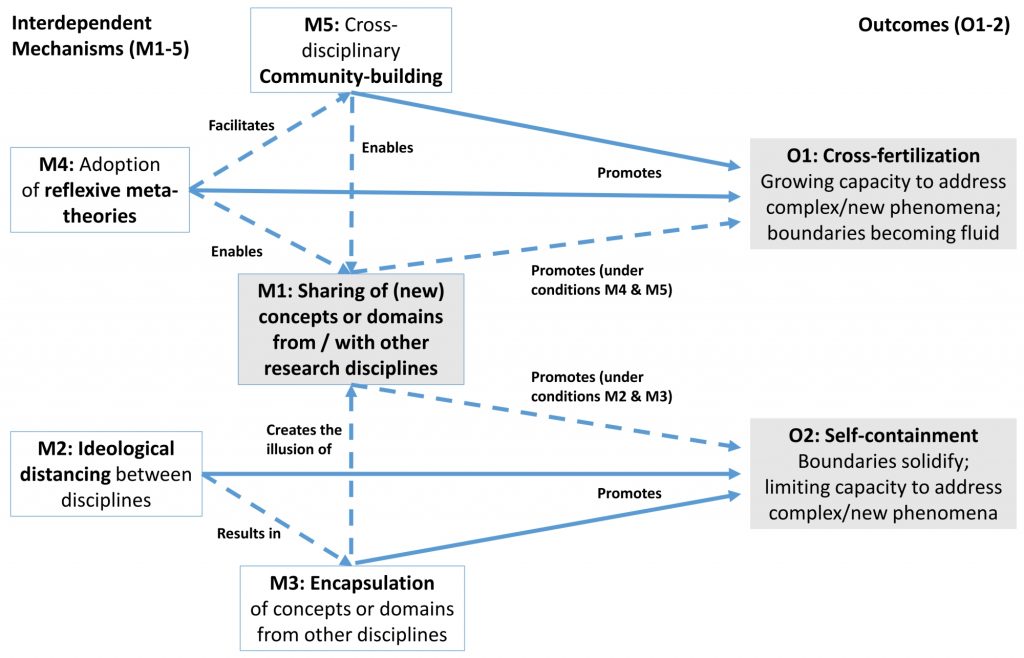
Lessons from two neighbouring research disciplines that failed to learn from each other
As research disciplines develop, they become more specialized, becoming associated with particular university departments, academic journals, research interests, associations, and educational programs. But specialization works against the solving of complex or multi-faceted societal problems. This has prompted researchers to engage in interdisciplinary research and cross-fertilization, where research disciplines can learn from each other. These efforts have delivered beneficial outcomes, but challenges remain.
A new study1 by Andrew Davies (University College London), Stephan Manning (University of Massachusetts Boston), and Jonas Söderlund (University of Linkoping) seeks to assist with overcoming these challenges by improving the understanding of the enablers and barriers to cross-fertilization across disciplines. To gain this understanding, Davies, Manning, and Söderlund examined two neighbouring disciplines that are highly influential in management and organization studies – innovation studies and project management research. Both disciplines have a focus on the management of novelty and uncertainty, and they share an interest in the study of projects that are highly innovative.
The illusion of shared learning
Recent studies suggest that the sharing of concepts, ideas and empirical domains with other disciplines is a key driver of cross-fertilization and the integration of new knowledge. However, Davies, Manning, and Söderlund found that while project management and innovation research share empirical domains, they failed to recognize each other’s contributions, with little cross-fertilization and cross-referencing from the 1970s to the 1990s.
Contributing to this were the significant ideological differences between the two disciplines, as shown in Figure 1:
The pursuit of conflicting ideologies – the optimizing and the adaptive models – played an important role here[;] … these separate ideologies contributed to a process of encapsulation … [in which] shared concepts or ideas from other disciplines are assimilated in line with a dominant ideology. More specifically, … the application of optimizing and adaptive models of organizing led to an encapsulation of the notions of ‘innovation’ and ‘projects’ in each discipline and the resulting inability of the two disciplines to recognize each other’s contributions.
This ideological distancing and encapsulation creates the illusion of shared learning; “projects were encapsulated by innovation scholars according to the adaptive model, and … innovation was encapsulated by project management scholars in line with the optimizing model.”

Davies, Manning, and Söderlund provide the following descriptions of the optimising and adaptive models:
The optimizing model relies on rationalistic planning, formal processes and analytical techniques applied at the start of a project to predict future conditions and reach a decision about the best end-product from a range of alternatives … The adaptive model, by contrast, recognizes that the goal of innovation (and the path to achieving that goal) is fundamentally uncertain. Rather than relying on up-front plans and formal processes, adaptive project management depends on intuitive judgment, informal processes and learning gained from trial-and-error experience to guide decision making.
So what works?
Innovation studies and project management research largely ignored each other’s contributions for several decades, but in recent years there has been greater cross-referencing and mutual recognition. Davies, Manning, and Söderlund argue that two inter-related approaches are behind this trend: the adoption of meta-theories and community-building initiatives across disciplinary boundaries.
Meta-theories
A meta-theory is a “theoretical framework or paradigm with generic and reflexive qualities that prompt scholars to question established assumptions.” Two meta-theories – theories of organizational learning and social practice theories of organizing – have recently influenced project management and innovation research and created bridges between the two disciplines.
The organisational learning perspective enables project-based firms to learn from their experiences and their environment so that they can better adapt to uncertainty, explore new strategic opportunities, develop innovative products and services, and create new markets.
The social practice perspective “emphasizes that project and innovation activities are embedded in and influenced by multiple social contexts … [it] encourages scholars to conceptualize norms and ways of doing things as potentially dynamic, contextual and subject to change, working against narrow ideologies, such as the optimizing model.”
Community-building initiatives
Joint community-building activities, such as conferences and workshops, have brought project management and innovation scholars together to share knowledge, debate ideas, and confront each other’s assumptions and agendas.
Both disciplines continue to host their own core disciplinary conferences, where there is little interaction between disciplines. However, both disciplines have also recently started inviting scholars from other disciplines to their conferences, and in a capacity that enables those scholars to make effective contributions.
Special multidisciplinary workshops and cross-boundary conferences are also being increasingly convened.
A model of cross-fertilization enablers and constraints
From their research, Davies, Manning, and Söderlund have developed a theoretical model of the enablers and constraints of cross-fertilization among different research disciplines, as shown in Figure 2.

The issue of identity
While beneficial to cross-fertilization, the adoption of meta-theories and community-building initiatives across disciplinary boundaries also poses a challenge to the identities of project management and innovation scholars.
As Davies, Manning, and Söderlund state, “with increasing cross-fertilization, how will each discipline maintain its own identity?” They recommend further research to address this issue, and advise that one way of dealing with it could be for disciplines to implement a balance of pure disciplinary and cross-disciplinary research and events.
Header image source: Knowledge-sharing on Wikimedia Commons is licensed by CC BY-SA 4.0.
Reference:
- Davies, A., Manning, S., & Söderlund, J. (2018). When neighboring disciplines fail to learn from each other: The case of innovation and project management research. Research Policy, 47(5), 965-979. ↩
Also published on Medium.






